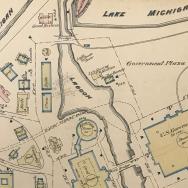A library is not just a building full of books—or, in an increasingly digital world, a repository for data and information. At its best, a library is a partner that can lead us toward a fairer society.
“Libraries exist to enable people to make the world a better, more equitable, more joyful place,” said Torsten Reimer, the University of Chicago’s new head librarian.
Reimer, who began his tenure as University Librarian and dean of the University Library on April 22, approaches his job by bearing in mind the needs of faculty, students, staff and other scholars. By incorporating this perspective, he champions a philosophy of a library as not only a service provider, but a research partner that offers its own expertise and intellectual agenda.
That includes prioritizing openness in scholarship to better share data and research, and helping users understand that the UChicago Library can be a collaborator at every stage of scholarship.
“With everything we do, we have to think about how our actions make a difference in someone’s life (usually, but not exclusively) by providing information, spaces, tools and inspiration,” said Reimer, who previously served at the British Library as Head of Content and Research Services, and at Imperial College London as the university’s Scholarly Communications Officer.
In the following Q&A, Reimer discusses his experience as a library leader and his reasons for coming to Chicago.

What motivated you to consider relocating to the U.S., and to the University of Chicago in particular?
Since moving to London in 2007, I have worked with many great colleagues in the U.S., making friends from coast to coast, and falling in love with U.S. culture and the country’s diverse landscapes. Living in the U.S. has been on my mind for a long time, and during the long pandemic lockdowns in the U.K., my partner and I decided that if we ever wanted to make that idea a reality, now was the time. As a born and bred Londoner, she was attracted to Chicago because of its size and cultural vibrancy. As someone who has studied at and worked in and with world-leading research organizations, I was attracted to the University of Chicago because of its global ambition and dedication to intellectual rigor—and because it is home to a great library with the potential to make a wider impact.
How would you like the Library to play a strategic role on campus and in Chicago?
On the campus, I see a growing role for the Library as a partner in the research process, in particular in areas related to data management, digital scholarship and scholarly communications.
Working with partners across the campus, we need to make it as easy as possible for faculty and students to manage and share their data and publications, reducing the complexity in areas like open access, funder reporting and research information management. Faculty and students should be freed from as many administrative tasks as possible, and that requires linking systems and workflows across the University. The best way to do that is to be involved as early as possible in the research process, and from a position where we can help advance scholarship beyond just providing infrastructure.
We also need to keep developing our collection to make a contribution to addressing key research and societal challenges—for example in areas such as climate change, racism, and information literacy and ethics. Looking beyond the campus itself, I see a role for the Library to be a window into the exciting research coming out of the University, and to be a helpful neighbor and partner in the South Side community. Libraries have long aspired to provide open and equitable access to their services, and for university libraries that—to me—has to be a commitment to the communities in which we live.
“Libraries exist to enable people to make the world a better, more equitable, more joyful place.”
Aside from the University of Chicago, is there a destination in the city that you are most looking forward to visiting?
Leaving aside the fantastic theatres, museums, and restaurants for a moment, I am probably most excited about getting my camera out for long architecture walks. I had a chance to photograph Chicago on previous visits, but there is so much more to explore.
You earned your graduate degrees in history at Ludwig-Maximilians-Universität in Munich, Germany. Has your research influenced your approach to leading libraries?
Back as an undergraduate, I already spent most of my time dedicated to digital library and digital humanities initiatives. During my Ph.D., I deliberately focused on the early modern collections of the British Library, Oxford and Munich, to immerse myself in the world of early printed books and special collections. From a library perspective, those years widened my appreciation of the role of collections in research. From an academic perspective, my research helped me to understand the information needs of graduate students and faculty and the challenges they face (in the early stages) of an academic career.
This experience has guided my work in and with libraries through a strong user orientation. We exist to serve our users—and the better we understand them, the better we can partner with them.
As the role of academic research libraries changes, what recent innovations do you think are most influencing scholarship today?
Possibly the most important contribution to scholarship is rethinking the library collection as open data, alongside the wider role libraries are playing in making content across the world findable, accessible, interoperable and reusable. Research libraries provide and support crucial infrastructure for knowledge sharing globally, and we enable open access to an ever-growing number of scholarly publications.
Free access to knowledge not only helps to improve society and address equity issues but also underpins data science and techniques such as text and data mining. Research libraries already have a long history of supporting digital scholarship, but the real impact of making collections and research outputs fully accessible and reusable will only now start to become visible, especially as we deploy persistent identifiers and other techniques to build semantic links between content.

In your professional career, is there an achievement in digital innovation and scholarly communications that you are most proud of?
Transforming scholarly communications services at Imperial College London is probably the most tangible one. Leading a cross-university team involving staff from the library, IT services, research office and faculties, I set out to build a research data infrastructure, to simplify research information management and to make it easier for faculty to make their research widely accessible. By focusing on improving workflows for and with faculty, we achieved all these aims, for example, increasing the annual upload of open access publications to the university repository from around 300 in 2012 to about 11,000 in 2016. I’d love to see something similar at the University of Chicago!
Your last role was at the British Library. Do you have any advice for exploring those collections?
I have always been proud to work at the British Library because it makes its collection freely available for everyone. You will still have to register before you can use the reading rooms, but there is neither a fee nor justification required. The BL’s collection is so vast, I find it difficult to recommend one area, but I have always been attracted to the early modern English prints, the vast map collection, and some of the modern treasures like sound recordings and first edition comic books. Whatever you are interested in, reach out to the reference team or a specialist curator before or during your visit—it isn’t just the collection but also the expertise of its staff that makes the British Library so useful.
If you come on a sunny day, have lunch at the street food market outside King’s Cross station—the sourdough donuts are the best. After your visit, try a London ale at the Somers Town Coffee House and then go for an Indian dinner at Dishoom. If you bring the kids, the Harry Potter experience on platform 9 ¾ at King’s Cross is just next door.
—A version of this story was first published by the University of Chicago Library.









